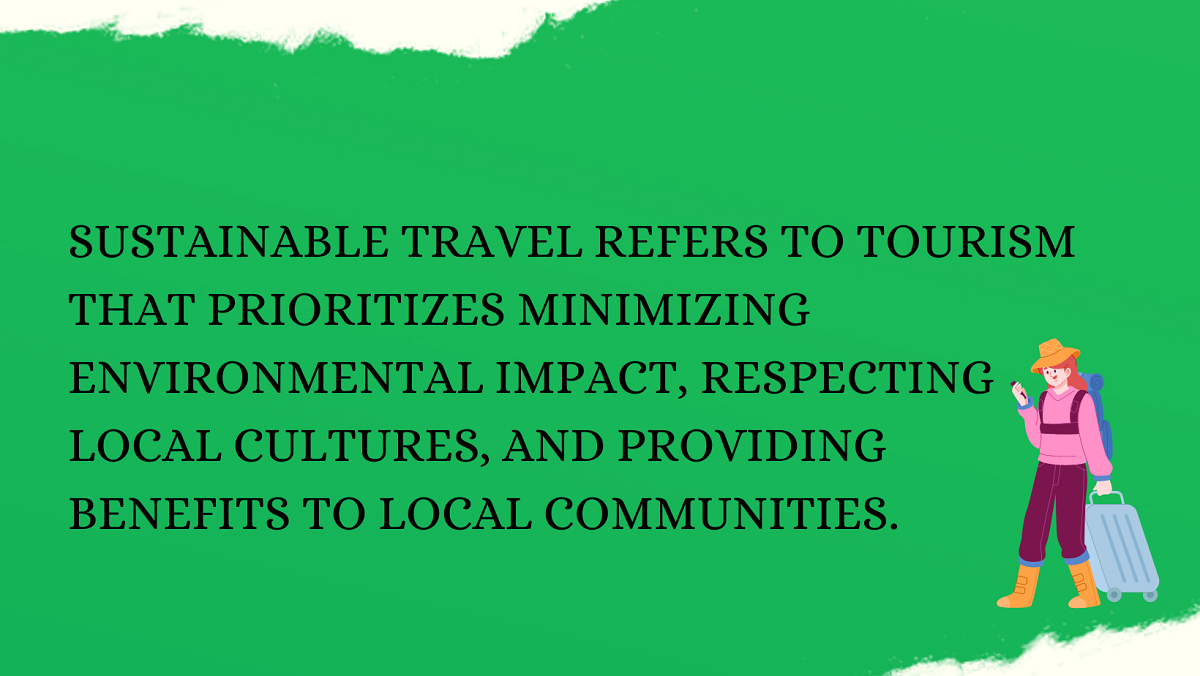Physical Address
304 North Cardinal St.
Dorchester Center, MA 02124
Physical Address
304 North Cardinal St.
Dorchester Center, MA 02124
Your guide to extraordinary adventures around the globe.
Your guide to extraordinary adventures around the globe.

As environmentally-minded travelers, we aim to see the world while minimizing our footprint. With some mindful planning, we can visit amazing places without harming fragile ecosystems and cultures.
Sustainable travel refers to tourism that prioritizes minimizing environmental impact, respecting local cultures, and providing benefits to local communities. The goal of sustainable travel is to preserve destinations for the future through mindful practices like conserving resources, reducing waste, choosing eco-friendly transportation and lodging, supporting local economies, and avoiding damage to ecosystems, wildlife, and cultural heritage.
Sustainable travel is crucially important to protect destinations for the future. By traveling responsibly, tourists can help preserve fragile ecosystems, endangered wildlife, and cultural heritage. Sustainable practices like conserving resources, reducing waste, and supporting local communities boosts economies and maintains authenticity. If done irresponsibly, tourism can damage environments, commercialize cultures, and lead to over tourism. That’s why it is vital we make mindful choices as travelers that minimize harm and preserve these special places we love exploring for generations to come. Sustainable travel ensures our adventures don’t destroy the very places that make them meaningful.
Here are my top tips for traveling sustainably and ethically on your next life-changing journey.
Make your accommodation part of the solution! Research and book eco-lodges, green hotels, and nature resorts that give back through environmental and social initiatives like solar power, recycling programs, hiring locals, operating education centers, and protecting acres of surrounding lands or marine areas.
Using trains, buses, boats, bikes, your own two feet or even ride shares is a greener way to get around than relying on flights or cruise ships. aim to fly less overall, choose nonstop routes which are more efficient, and offset your flight carbon through verified nonprofits. For road trips, rent electric or hybrid cars rather than gas-guzzling SUVs.
Packing light not only eases your travels, it reduces carbon emissions from fuel burned. Stick to a carry-on by packing versatile, mix-and-match clothing in sustainable fabrics like bamboo, hemp, recycled polyester and organic cotton. Bring eco-friendly toiletries in reusable containers like shampoo bars instead of mini plastic bottles. Never forget your reusable water bottle, straw, utensils and shopping bags.
Seeking out locally-owned restaurants, cafes, shops, tour operators and guides supports communities economically while reducing your environmental impact. For souvenirs, purchase locally made handicrafts, art, spices, coffee, chocolate and fabrics directly from the artisans and creators.
Use water, AC, heat and electricity sparingly during hotel stays. Turn off lights and AC when not in your room. Never leave water running. Reuse towels and sheets when possible. Dispose of trash and recycling properly. Every bit of conservation helps protect scarce resources.
Seek out responsible tour operators devoted to sustainability through actions like collecting plastics, offsetting carbon emissions, hiring local guides, and supporting environmental projects or vulnerable communities. Opt for walking, hiking, biking and kayaking tours rather than more disruptive 4WD or motorized boat tours.
Observe all rules and codes of conduct when visiting protected lands and marine environments. Never feed, handle or interfere with wild animals – simply observe respectfully from a distance. Stay on marked trails to avoid trampling fragile flora. Be an advocate for threatened species!
Savor the local flavors by dining at organic, eco-friendly restaurants, farms, and markets. Trying regional cuisine boosts the economy and reduces your food miles. Seek out fair trade, shade grown coffee and tea. Bring reusable containers and bags to avoid excess plastic waste.
Every mindful choice we make as travelers protects our planet’s precious natural resources and cultural heritage. Let’s explore sustainably!